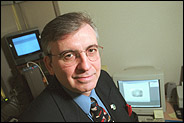Rolando Del Maestro
Dr. Rolando Del Maestro is widely considered to be one of the best neurosurgeons in Canada, if not the world. Still, he knows he can't do it alone in the battle against brain tumours.
 PHOTO: Owen Egan
PHOTO: Owen Egan |
|
Which is why Del Maestro recently took on the challenge of becoming the clinical director of the Montreal Neurological Institute's fledgling Brain Tumour Research Centre.
His work at the centre, opened last year, takes advantage of the state-of-the-art facilities at the MNI. "[This] is the first free-standing brain tumour research centre in the world," he says. "There's all kinds of people with expertise in any area that you might need to get into."
The knowledge the medical profession has about tumours has progressed to the point that individual labs with a few researchers won't be able to make significant advancements, according to Del Maestro.
"Many of the simple questions have been answered," he says, adding that more complex problems in the field require larger teams of researchers who offer a diverse range of skills.
"You have to be able to do this to compete."
Del Maestro came to McGill from the University of Western Ontario, in London, where he was the director of UWO's Brain Research Laboratory.
His interests in brain research extend beyond the operating table or laboratory. In 1981, Del Maestro, his wife Pam, a registered nurse, and Steve Northey, who lost his daughter to a brain tumour, established the Brain Research Fund. Today the fund has evolved to become the Brain Tumour Foundation of Canada, an organization that has raised close to $1 million to support brain research in Canada, in addition to producing educational documents and other services for patients.
Del Maestro also helped establish the Brain Tissue Bank, which stores brain tissue samples and makes them available to researchers.
His current research at the MNI aims to overcome problems that scientists have had in the past in learning how tumour cells behave. By putting tumour cells in a gel and observing them through time-lapse microscopy, he has been able to observe in three dimensions how a tumour grows and sends out invading cells. He hopes that by learning what signals these cells respond to, he may be able to develop a treatment that manipulates the signals.
Del Maestro describes it like a war: "We can pick out artillery, like the tumour, but we can't pick out where the guerrillas (individual cells) are."
Having devoted most of his professional life to the war on cancer, Del Maestro is optimistic for the future of the field.
"My thinking is that there is going to be an explosion in our knowledge of brain tumours," says Del Maestro. He sees a great deal of promise in genetics, and believes that it will drastically change how cancer is treated.
He points out that two people with the exact same kind of tumour can have radically different responses to the same treatment. The reason for this lies in the individuals' genes.
"It's not what [the tumour] looks like, it's what it does," he asserts. "One could imagine in the future we could tailor the individual patient's treatment according to the genetics of their tumour."
Former MNI director and neurosurgery professor Dr. William Feindel is pleased that Del Maestro has decided to make McGill his new home.
"I'm delighted he's here at the Neuro," says Feindel. "We tried to get him to come 15 years ago."
Feindel isn't just happy to have Del Maestro aboard for his medical skills. As the honorary Osler Librarian, and a medical history enthusiast, Feindel is thrilled that Del Maestro has brought his comprehensive library on Leonardo da Vinci to Montreal.
"I think it must be one of the best private collections on Leonardo anywhere," says Feindel.
Del Maestro's collection contains a number of early editions of books on and about the Renaissance master. The collection contains more than 2,000 items, some produced by da Vinci's students and contemporaries and some of them about 500 years old. He also owns the French and Italian first editions of da Vinci's classic book on painting.
Da Vinci painted the Mona Lisa and the Last Supper, dissected human corpses to conduct his own pioneering anatomical research and devised a theory of mechanics illustrated with strange machines centuries ahead of their time.
Del Maestro told The London Free Press he admires da Vinci as "the epitome of the Renaissance man -- the man with wide and penetrating interests. In our age of specialization, we have largely destroyed that."
Del Maestro has curated two exhibits on Leonardo, and hopes to arrange another here in Montreal for next year.
"2002 will be the 550th year since he was born -- and we're still talking about him," says Del Maestro with a laugh.

